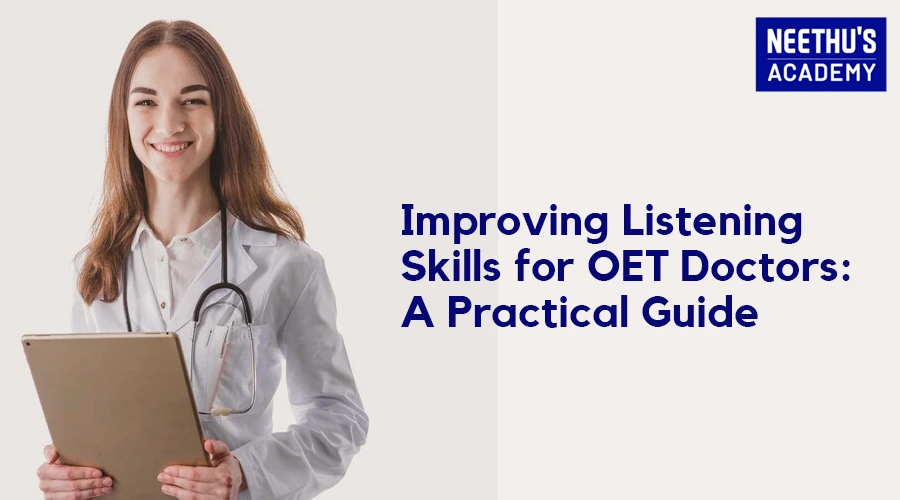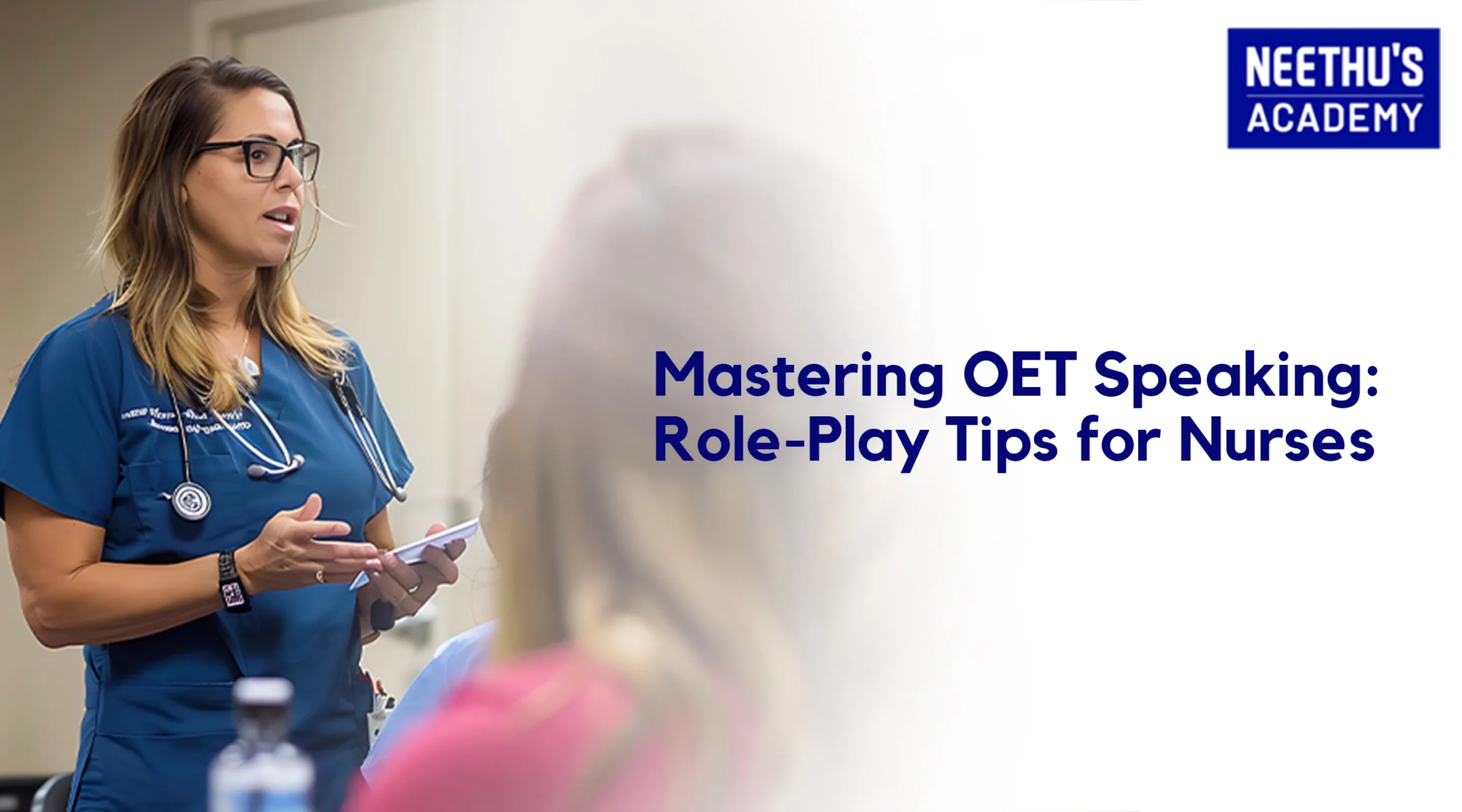OET Listening Tips for Doctors: Practical Strategies for Success
The Occupational English Test (OET) is an important step for healthcare professionals seeking employment in English-speaking settings. Among its components, the Listening sub-test is particularly significant for doctors. A good mastery of listening skills will assure you that you can master challenging medical situations, communicate appropriately, and provide quality services.
This blog provides OET Listening Tips, practical strategies, and insights into resources like online OET classes for Doctors to help ace this exam section.
Listening means more than just hearing. It is a process of actively understanding and interpreting crucial information for doctors. The accompanying challenges to taking the OET listening sub-test for doctors include many accents, fast-flowing conversations, and technical medical vocabulary. Practice combined with proper guidance has helped ward off these challenges and clear this test.
OET Listening Test for Doctors: What does it entail?
OET Listening sub-test evaluates how well you can comprehend spoken English in a healthcare scenario. It’s divided into three parts:
- Part A: Consultation Extracts: It includes two patient consultations. Make sure to take notes on what you hear.
- Part B: Short Workplace Extracts: Six short recordings, such as team briefings or handovers. You’ll have to answer multiple-choice questions.
- Part C: Presentation Extracts: Two longer recordings of professional presentations. You’ll be asked to answer multiple-choice questions, noting the views of the speaker or main points.
Why Listening Is Important to Doctors
Listening enables doctors to get the patient’s complaints correctly, collaborate with colleagues, and translate pertinent updates in busy settings. Bad listening can result in misdiagnosis or mistakes in treatment, which underlines the importance of getting it right both for the OET exam and in real-life practice.
Key Issues in OET Listening for Doctors
Accents and Speed of Speech
A variety of accents and speech speeds are used in the OET: Australian, British, and American. The natural flow of speech can be challenging, especially when speakers use idiomatic expressions or colloquialisms.
Tip: Practice with authentic material such as podcasts on medical topics or recordings with various accents.
Identifying Key Information
Doctors need to distinguish between key information (e.g., symptoms or diagnoses) and ancillary information. It is particularly important in Part A of the test when answering requires note-taking.
Tip: Pay attention to the words and phrases such as “recent”, “severe”, or “chronic” since these words usually contain important information.
Technical Medical Terminology
The test contains technical and medical terms, abbreviations, and jargon. If not familiar with them, they can be tricky to decipher.
Tip: Make flashcards of commonly used medical terms and review them over and over.
Practical OET Listening Tips for Doctors
Practice Realistic Medical Scenarios
Use audio OET materials to practice for clinical conversations. These scenarios get you habituated with real-life conversations between doctors and patients or colleagues.
For instance,
Listen to audio recordings of consultations and attempt to take down the patient’s complaints and doctor’s responses.
Train active listening.
Active listening concentrates on a speaker, comprehends the message, and responds appropriately.
How to Build This Ability:
- Practice mindfulness while doing listening exercises
- Do not get distracted; just focus on the audio.
- After listening, write a summary to check your understanding
Develop Note-Taking Skills
The note-taking skill has to be efficient, particularly in Part A. Create a shorthand system by using symbols, abbreviations, or keywords that can quickly jot down important information.
Example:
Use “c/o” for “complains of” or “Rx” for “treatment.”
Pay Attention to Latest Medical Topics
Know the basics, such as managing diabetes, heart diseases, and respiratory diseases. These are commonly tested in the OET.
Resource tip: Stream medical documentaries or listen to healthcare-related podcasts to get familiar with these topics.
How to Practice Listening for OET Doctors
Use Online Listening Tools and Apps Platforms like YouTube, Spotify, and specialized OET preparation websites provide a treasure trove of listening practice OET.
Some good ones include:
- BBC Learning English: Has a lot of materials covering global accents.
- E2Language: There are OET-specific materials.
- Medical English Podcasts: This one focuses on healthcare-based situations.
Simulate Exam Conditions
- Replicate the exam experience by:
- Practicing under timed conditions.
- Never pause or rewind.
- Wearing noise-cancelling headphones to replicate the exam conditions as well.
Join Group Discussions
Interact with peers or online classes for OET. Group discussions enable you to:
- Discuss tips and strategies.
- Listening to various accents and speech.
Common Mistakes OET Listening Comprehension
Overemphasizing on One Point
Sometimes you dwell on one word or phrase that you failed to get, and end up missing information.
How to Overcome: Train yourself to shift quickly and concentrate on the message.
Misinterpreting medical word
Medical terminology can cause confusion, which might end up causing mistakes.
Solution: Master new terminology using flashcards, medical dictionaries, or apps.
Failure to use Context Clues
Context clues such as the tone or the surrounding conversation often carry essential meanings.
Solution: Practice discerning the speaker’s intention based on tone and word choice.
Advantages of Professional Coaching for OET Listening
Benefits of Online OET Classes includes:
- Access to expert instructors familiar with OET.
- Practice materials designed specifically for OET listening practice.
- Guidance for overcoming specific weaknesses.
Best OET Coaching Centre for Pharmacists in Kerala
Neethu’s Academy is among the top, providing:
- Personalized Attention to doctors.
- Mock tests for an experience close to the real exam.
- Flexible online schedules to match the professionals’ time.
Conclusion
It requires constant efforts and the right guidance to move from understanding accents to mastering technical terminology that can improve your OET listening skills. This leads you toward succeeding and excelling in your medical career.
By resorting to audio OET materials for doctors, joining online OET classes, and practicing, you can overcome all challenges and confidently face the Listening sub-test of the OET.
So, start preparing today and make your success journey with professional help from the best online OET coaching center in Kerala!
Frequently Asked Questions





